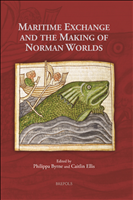Maritime Exchange and the Making of Norman Worlds
240 p.
Between c. 1000 and c. 1200 ad, emigrants from Normandy travelled long distances from their homeland, spreading their political influence to the shores of the North Sea, the Irish Sea, the Mediterranean, the Black Sea, and the Baltic. Their willingness to cross the seas gave Normans access to new territories and new ideas, extending their authority and reputation far beyond northern France. But how and why were these Norman groups able to develop such power? The chapters collected here engage directly with this question by examining the sites and processes that underpinned this expansion. The contributors ask what different Norman groups took from the societies around them, and what they rejected; they consider how non-Norman powers - in Ireland, England, the Fatimid Caliphate, Byzantium, the Holy Land, and Rus - responded to, and were shaped by, their interactions with Normans in contested zones; and they examine how Normans understood and imagined their own relationship with the sea as a place of exchange,.
a zone of uncertain control, and an ambiguous kind of border. Drawing together material culture and written evidence, this far-reaching volume offers a fully-developed discussion of how, and in what ways, these Norman worlds and societies could be said to be 'transcultural', and in doing so, makes a compelling case that attention to movement and maritime exchange must be central to our understanding of the extension of Norman influence in this period. [Publisher's text].
Special access authorizations may apply; please contact us for further information.
-
Información


